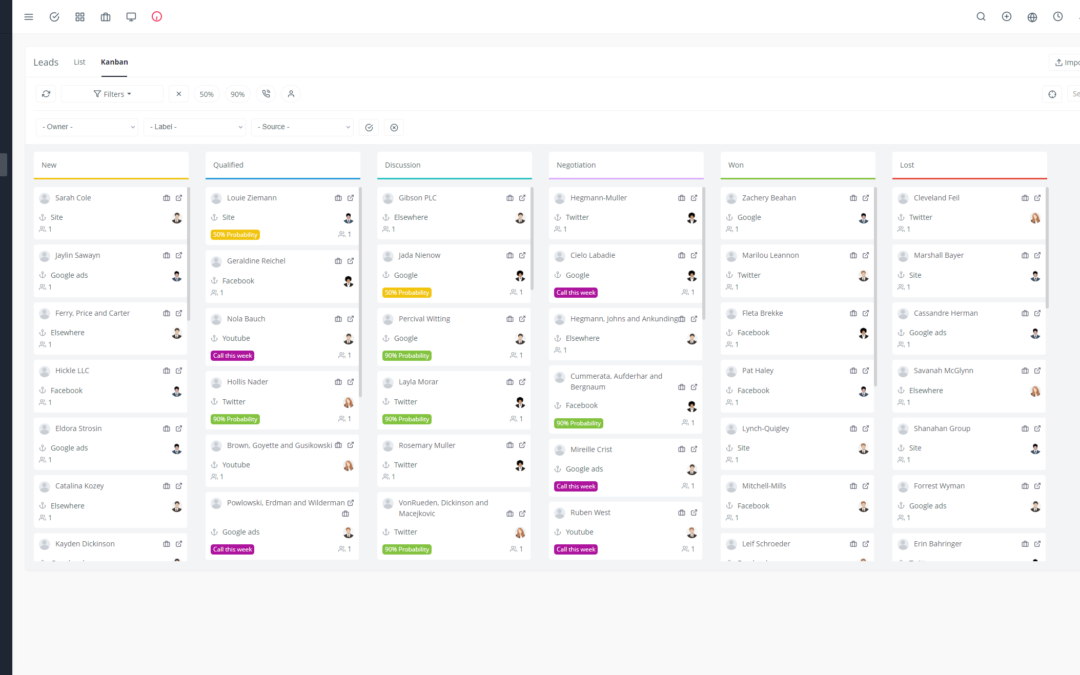Running a marketing agency involves juggling numerous clients, projects, and tasks. An effective CRM is crucial for organizing your contacts, managing leads, automating campaigns, and tracking performance.
Two popular platforms stand out: Yoneos and Zoho CRM. But which one should you choose for your agency? 🧐
Overview of the Two CRM Platforms
Yoneos is a CRM platform focused on project management and services. It stands out for its intuitive interface and emphasis on team collaboration.
Zoho CRM is a comprehensive solution offering a wide range of features, from marketing automation to sales management. It’s known for its flexibility and extensive customization options.
Key Features
Yoneos:
Project Management: Create, plan, track, and collaborate on projects.
Task Management: Assign, track, and manage tasks for each project.
Invoicing: Create quotes and invoices, manage payments.
Knowledge Base: Create and share resources for your team and clients.
Integrations with Slack and Google Drive.
Zoho CRM:
Lead Management: Capture, qualify, and track leads.
Marketing Automation: Email campaigns, lead nurturing, lead scoring.
Contact Management: Segment, categorize, and interact with clients.
Sales Tracking: Manage opportunities, pipelines, and forecasts.
Reporting and Analytics: Custom dashboards and reports.
Integrations with numerous marketing and sales tools.
Feature Comparison
| Feature | Yoneos | Zoho CRM |
|—|—|—|
| Lead Management | ⚪️ | 🟢 |
| Marketing Automation | ⚪️ | 🟢 |
| Contact Management | 🟢 | 🟢 |
| Sales Tracking | 🟢 | 🟢 |
| Reporting | 🟢 | 🟢 |
Yoneos excels in project and task management, while Zoho CRM offers a comprehensive solution for lead management, marketing automation, and sales tracking.
Integration with Other Marketing Tools
Yoneos integrates with tools like Slack and Google Drive, while Zoho CRM offers a broad range of integrations with popular marketing tools such as Mailchimp, Google Analytics, and Facebook Ads.
Ease of Use and User Interface
Yoneos is known for its simple and intuitive interface, ideal for small teams. Zoho CRM, while more complex, offers a customizable interface with a wide array of features.
Customization Options
Zoho CRM offers advanced customization options, allowing users to create custom workflows, reports, and dashboards. Yoneos provides more limited customization options.
Pricing and Plans
Yoneos offers affordable plans, suitable for small and medium businesses. Zoho CRM offers a variety of plans with different features, allowing businesses to choose the option that best suits their needs and budget.
Customer Support and Assistance
Both Yoneos and Zoho CRM offer customer support via email, phone, and chat. Zoho CRM also offers a community forum and an extensive knowledge base.
Use Cases for Marketing Agencies
Yoneos is ideal for agencies seeking a simple and efficient platform to manage their projects and tasks, especially for short-term projects.
Zoho CRM is better suited for agencies wanting to manage leads, automate marketing campaigns, and track sales in-depth.
Advantages and Disadvantages
Yoneos:
Advantages:
Simple and intuitive interface.
Effective project management.
Affordable pricing.
Disadvantages:
Limited marketing automation features.
Reduced customization options.
Zoho CRM:
Advantages:
Comprehensive features for lead management, marketing automation, and sales tracking.
Advanced customization options.
Integrations with numerous marketing tools.
Disadvantages:
More complex user interface.
Higher pricing than Yoneos.
Concrete Examples of Use
Yoneos: A digital marketing agency could use Yoneos to manage projects for website creation, SEO campaigns, and content marketing.
Zoho CRM: A B2B marketing agency could use Zoho CRM to qualify leads, automate nurturing campaigns, and track sales opportunities.
Recommendations for Choosing the Right CRM Platform
Agency Size and Budget: Yoneos is ideal for small agencies with limited budgets. Zoho CRM is better suited for larger agencies with more complex needs.
Required Features: If you need marketing automation, lead management, and sales tracking features, Zoho CRM is a better choice. If you’re looking for a simple platform for project and task management, Yoneos might be more suitable.
Team Experience and Skills: Zoho CRM may require more training due to its complexity. Yoneos is easier to learn.
Tips for Implementation and Configuration
Define agency objectives and needs.
Choose the appropriate CRM platform based on those needs.
Train your team on how to use the platform.
Configure workflows, reports, and dashboards.
Integrate the platform with other marketing tools.
Best Practices for Using Yoneos or Zoho CRM
Utilize automation features to save time.
Keep contact information updated regularly.
Segment contacts for more targeted marketing campaigns.
Track campaign performance and adjust strategies.
Communicate important information to the entire team.
Future Outlook of the Two CRM Platforms
Both Yoneos and Zoho CRM continue to evolve and add new features. Yoneos focuses on improving its team collaboration and project management features, while Zoho CRM expands its marketing automation and data analytics offerings.
In conclusion, choosing between Yoneos and Zoho CRM depends on your agency’s specific needs. If you’re looking for a simple and effective solution for project management, Yoneos is a good choice. If you need a comprehensive platform for lead management, marketing automation, and sales tracking, Zoho CRM is the better option.

